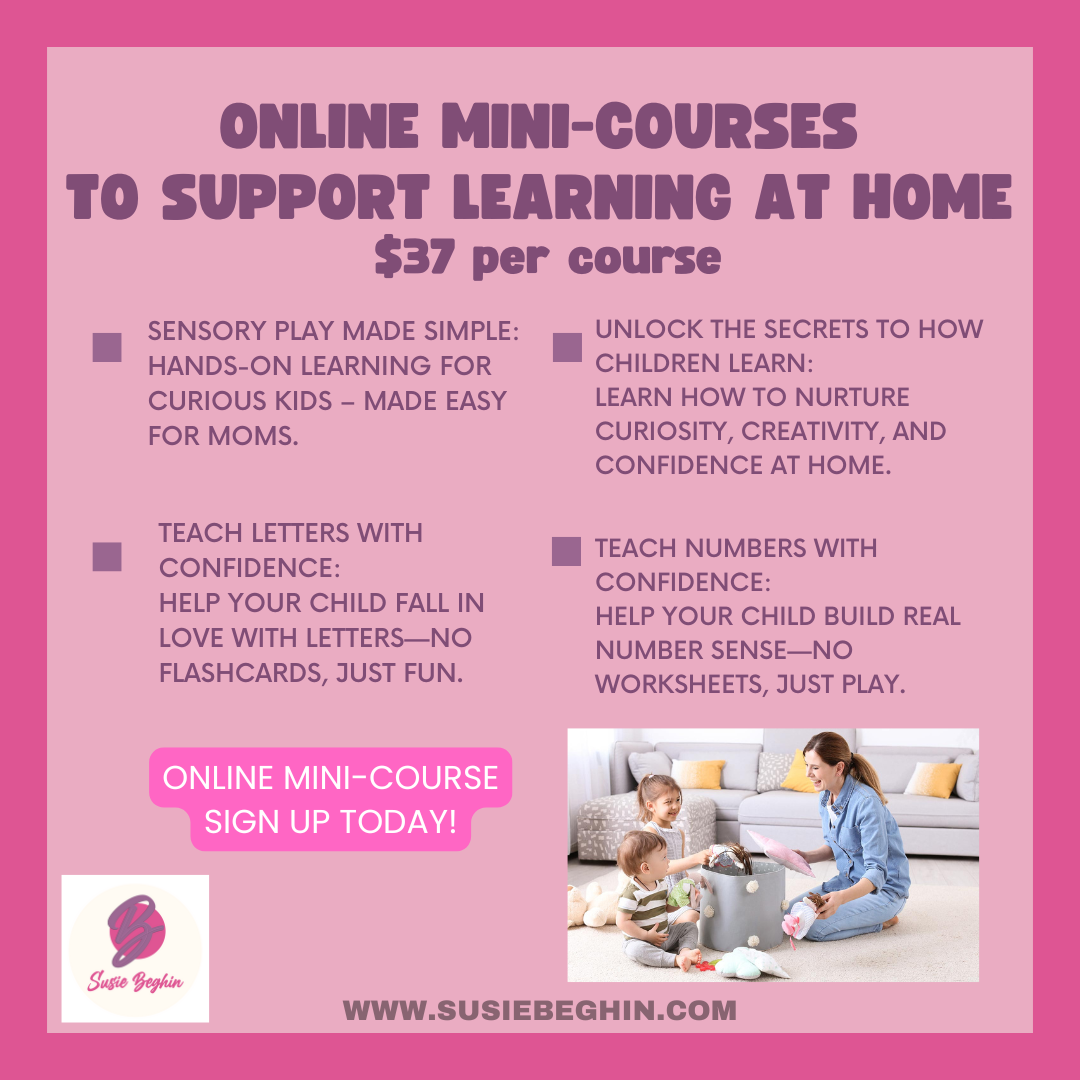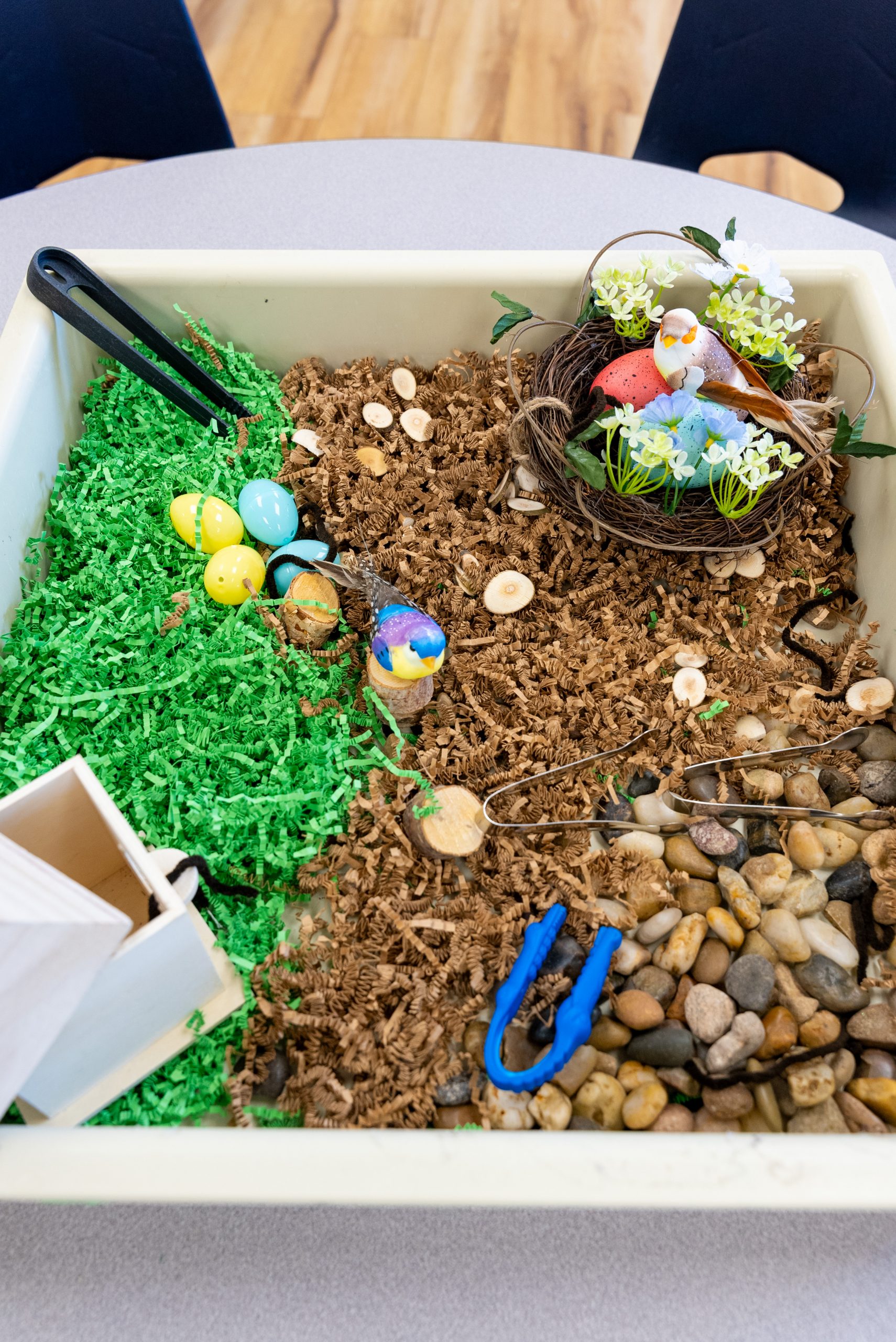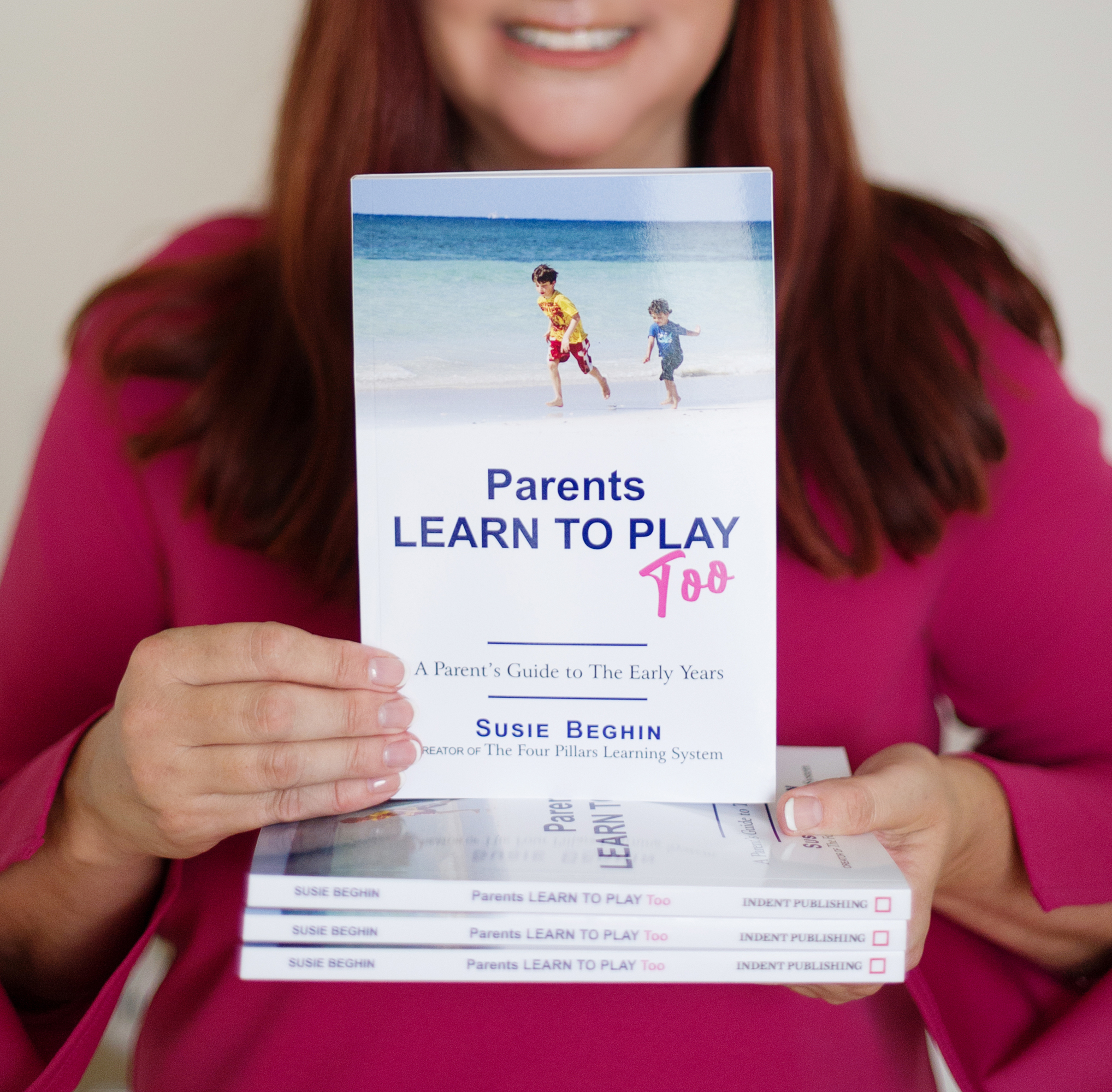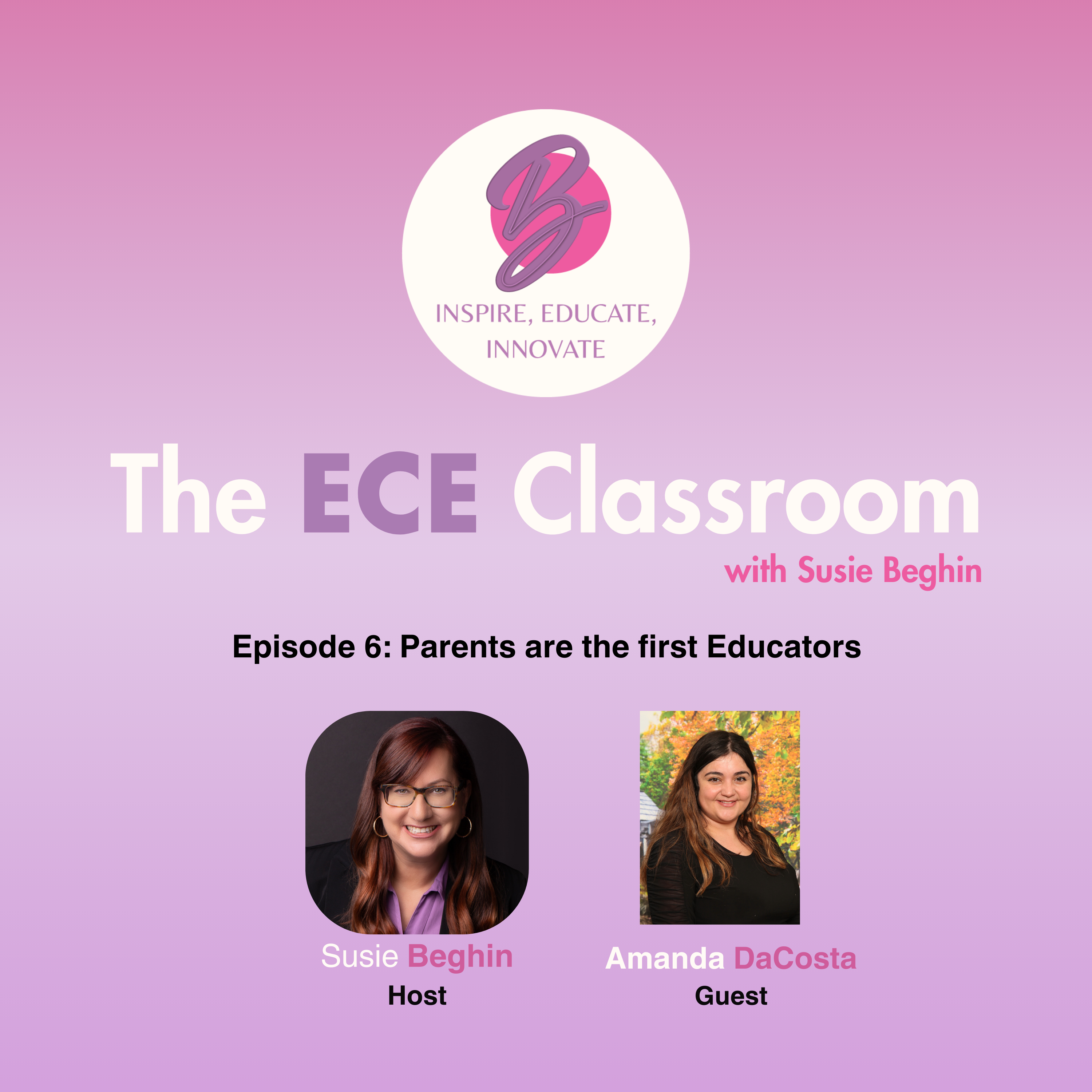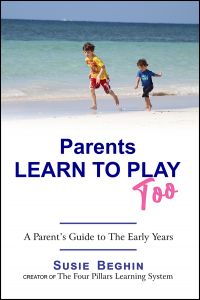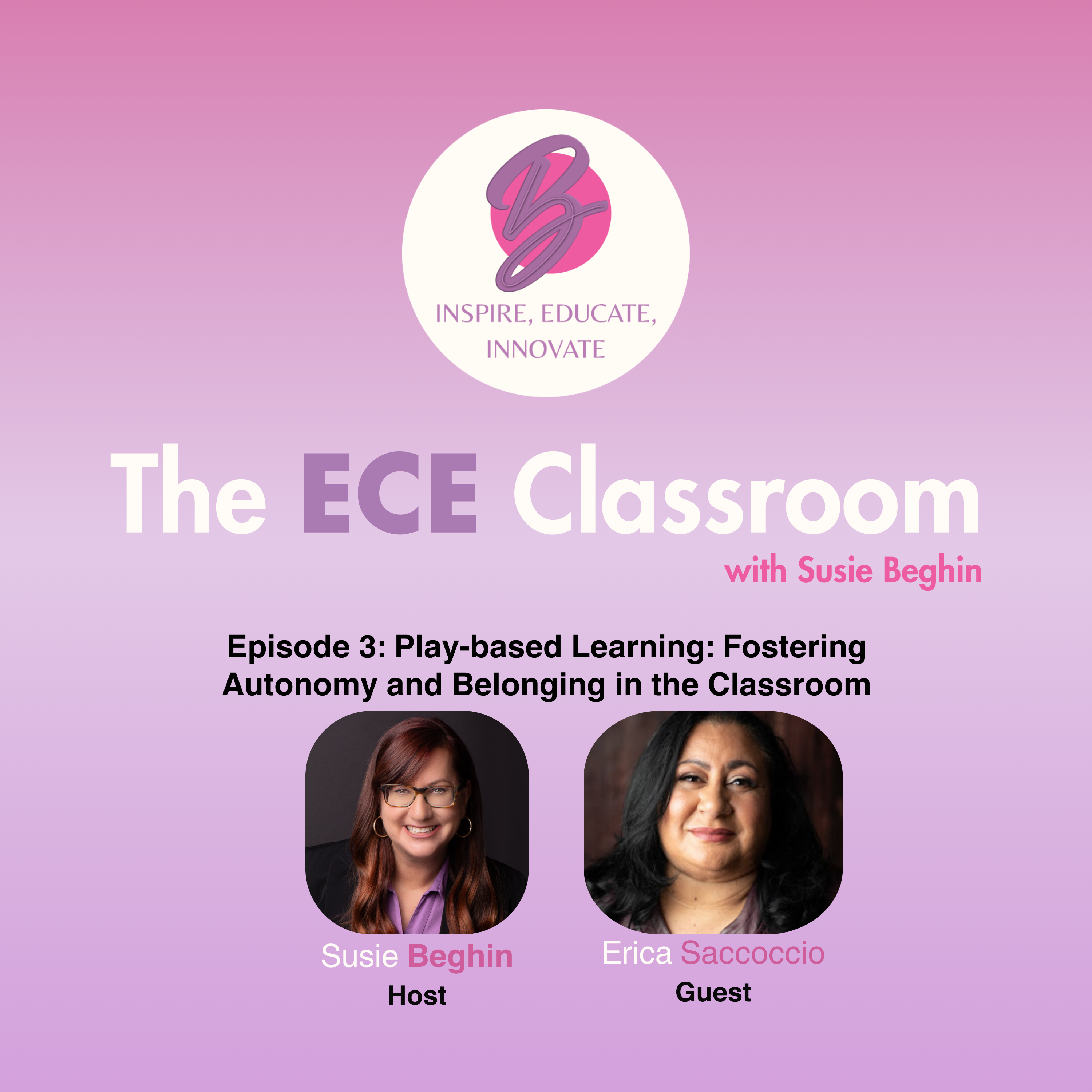Fall Sensory Play Ideas for Kids
Fall Sensory Play Ideas for Kids
Fall is the perfect season to bring the magic of sensory play to life. The vibrant colors, cozy scents, and natural textures offer endless opportunities for hands-on learning — and the best part? You can set up these activities with simple, everyday materials you probably already have at home or in your classroom.
Whether you’re a parent, caregiver, or educator, these fun, affordable, and developmentally appropriate ideas will make learning through play a breeze.
Seasonal Sensory Bin Ideas
- Pumpkin Patch Bin 🎃
- What You Need: Dried corn kernels, mini pumpkins, small scoops, cups, and a shallow bin. If you have a child under 3, you can substitute the corn kernels with water, sand or shredded paper.
- How to Play: Children can scoop, pour, and “plant” the pumpkins while practicing fine motor skills.
- Apple Orchard Bin 🍎
- What You Need: Red pom-poms (to represent apples), cinnamon sticks for scent, small baskets, tongs/tweezers and scoops.
- How to Play: Encourage kids to “pick” the apples, count them, and sort them into the baskets.

- Autumn Nature Hunt Bin 🍂
- What You Need: Real or faux leaves, pinecones, acorns, twigs, and magnifying glasses. Add some scoops, tongs/tweezers and plastic containers to sort the items.
- How to Play: Invite children to explore different textures and shapes while talking about colors, sizes, and patterns. Older kids can take on a sorting challenge and sort by colour, size or type of item.
Fall-Themed Sensory Play Recipes
Pumpkin Spice Play Dough ✨
Bring the smell of fall indoors with this cozy, hands-on activity that kids will love.
- What You Need: Flour, salt, cream of tartar, water, oil, orange food coloring, and pumpkin spice.
- How to Play: Roll, squish, and sculpt pumpkins, leaves, or letters for endless fun.
- Bonus: Watch this quick video for the play dough recipe and see how you can make homemade pumpkin spice play dough in just minutes.

Outdoor Sensory Adventures
Don’t forget — sensory play doesn’t have to stay indoors! Here are a few ways to take the learning outside this season:
- Leaf Crunch Walk 🍁
Take a walk and collect fallen leaves. Once you’re back, sort them by size, color, or shape. This simple activity builds vocabulary, observation, and sorting skills — plus, nothing beats the satisfying crunch of stepping on fall leaves.
- Nature Sound Hunt 🎧
Head outside with a simple checklist and invite kids to listen for the sounds of fall — rustling leaves, chirping birds, or the wind blowing through the trees. For younger children, keep it simple with picture prompts; older kids can check off or even draw what they hear.
- Pumpkin Washing Station 💦
Grab a few buckets, fill them with warm water, and add scrub brushes for a simple, engaging cleanup station. Kids will love washing and scrubbing small pumpkins while developing hand strength and coordination.

Mess-Free Sensory Options
Need something quick and cleanup-friendly? Try these simple, no-mess sensory setups:
Fall Sensory Bags 👜
- What You Need: Zip-top bags, water, glitter, leaves, and small seasonal items like faux flowers or mini acorns.
- How to Play: Fill the bag, seal tightly (tape edges for extra security), and secure it to a table or window. Children can squish, press, and explore without any mess.
- Bonus: Watch this quick video to see how you can make a sensory bag in just minutes.

Tip: Want more ideas like this? Get step-by-step guidance in my Sensory Play Made Simple mini-course — perfect for parents and educators looking for easy, play-based learning setups.
Final Thoughts
Fall is such a sensory-rich season — and the perfect time to explore the world through touch, sound, sight, and even smell. Whether you’re setting up a pumpkin patch sensory bin, heading outdoors for a leaf crunch walk, or creating a mess-free sensory bag, each of these activities helps children build important skills while having fun.
Ready to take your sensory play to the next level? Check out my Sensory Play Made Simple mini-course for more easy, affordable, and brain-boosting ideas that you can start using today.
Struggling to Support Your Child’s Learning at Home? Easy Mini-Courses Designed Just for Moms!
Struggling to Educate at Home? Easy Mini-Courses Designed Just for Moms!
I’m so excited to announce a brand-new lineup of mini-courses designed to give you the tools, confidence, and ideas to support early learning—without the overwhelm.
Whether you’re a parent, caregiver, or early childhood educator, these short and practical courses were created with you in mind. No fluff. No pressure. Just real strategies you can use right away.
Why Mini-Courses?
Because you’re busy—and you want quick wins that make a real impact.
Each course is:
✅ Short & focused
✅ Packed with useful, real-world ideas
✅ Designed to fit into your life—not take it over
✅ Budget-friendly and accessible anytime
These aren’t just courses—they’re confidence boosters.
🎉 What’s Inside? Here’s a Look at the Newest Mini-Courses:
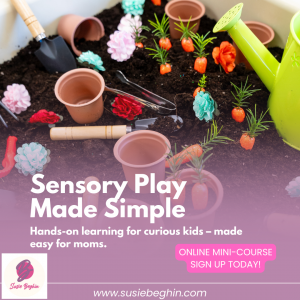
📦 Sensory Play Made Simple
Hands-on learning for curious kids – made easy for moms.
Curious about sensory play but not sure where to start? You’re not alone—and this course is here to guide you.
You’ll learn:
- Why sensory play supports brain, body, and emotional development
- How sensory activities build focus, language, and motor skills
- How to create fun setups in under 10 minutes
- How to adapt activities for different ages, needs, and styles
Walk away feeling inspired and equipped to create powerful play experiences—using what you already have at home.
Click here to sign up.
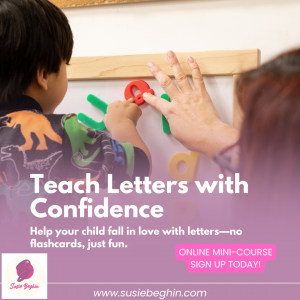
🔤 Teach Letters with Confidence
Help your child fall in love with letters—no flashcards, just fun.
Forget the drills and pressure. This course helps you teach early literacy through joy, connection, and hands-on play.
You’ll learn:
- How letter learning really works
- Playful strategies that build confidence
- Ways to make letters part of everyday moments
Perfect for parents and caregivers who want to make early reading feel natural, not forced.
Click here to sign up.

🧠 Unlock the Secrets to How Children Learn
Learn how to nurture curiosity, creativity, and confidence at home.
This course dives into the brain science of how young children actually learn—through play, connection, and curiosity.
You’ll learn:
- Why curiosity is your child’s best learning tool
- How play outperforms repetition and drills
- How to turn everyday moments into meaningful learning
Ideal for parents, educators, and anyone who wants to support learning without stress.
Click here to sign up.
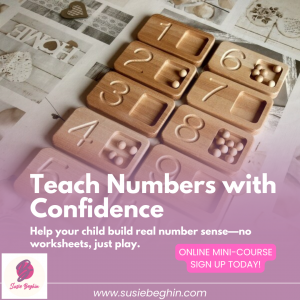
🔢 Teach Numbers with Confidence
Help your child build real number sense—no worksheets, just play.
If you’re unsure how to teach early math in a way that actually sticks, this course is for you.
You’ll learn:
- What number sense looks like in early childhood
- How to introduce counting, quantity, and number recognition
- Simple games and strategies to teach math through play
Great for educators and parents who want to ditch the flashcards and teach math the way kids learn best.
Click here to sign up.
🎓 Ready to Learn, Grow, and Play?
These mini-courses are designed to meet you right where you are—with real-world tools you can use the same day.
Whether you’re looking for fresh ideas or a little reassurance, I’ve got you.
👉 Explore the courses now. Click here to sign up.
Start anytime. Learn at your pace. Keep access for good.
Let’s make learning joyful again—because when adults feel confident, kids thrive.
A Guide to Gardening with Kids: Growing More Than Just Plants!
A Guide to Gardening with Kids: Growing More Than Just Plants!
If you’ve ever handed a toddler a watering can, you know the magic that happens when kids get their hands in the dirt. Gardening isn’t just about growing veggies or pretty flowers—it’s about growing curious minds, responsible little humans, and hands-on learners.

Why Garden with Kids?
Gardening offers powerful learning moments that offer hands-on inquiry, discovery, and STEAM exploration. Here’s what kids really get when they garden:
🧠 Science Smarts
From seed to sprout, kids learn about lifecycles, weather, insects, and ecosystems—STEAM learning in real life!
💪 Fine & Gross Motor Skills
Digging, scooping, and planting help build coordination and strength.
❤️ Responsibility & Patience
Caring for a plant teaches kids that growth takes time, effort, and a whole lot of love.
😌 Mindfulness & Sensory Play
Gardening is calming and full of rich sensory experiences—from soft petals to the squish of soil.
Easy Gardening Ideas for Kids
You don’t need a backyard or fancy tools to start! Try these:
🌼 Container Garden
Plant herbs or flowers in a small container with a little soil. Place it on a sunny windowsill and watch the magic begin.
🥕 Root Veggie Re-Grow
Use kitchen scraps like carrot tops or green onions in shallow water and watch them regrow.
🪴 Gardening Sensory Bin: Dig Into Discovery!
Not quite ready for a full garden? Create a Gardening Sensory Bin that brings the outdoors in—perfect for toddlers and preschoolers!
What You’ll Need:
- A shallow bin or container
- Soil (avoid potting soil with fertilizer unless you plan to use gloves)
- Small faux or real flowers
- Mini gardening tools or spoons
- Toy bugs, worms, and seeds
- Small pots or cups
- Water spray bottle and/or watering can
How to Play:
Let your child dig, plant, scoop, and explore. Encourage pretend play like planting flowers, watering them, or finding worms in the soil. Ask open-ended questions:
💬 “What do you think this bug eats?”
💬 “How can we help this flower grow?”
Why It’s Great:
This bin is loaded with sensory play, language development, fine motor practice, and imaginative exploration—all wrapped up in one fun activity.

Tips for a Successful Garden Experience
- Let kids take the lead—even if it gets messy. It’s their garden too!
- Talk about what you’re doing and ask questions: “What do you think this seed needs to grow?”
- Celebrate small wins: “Look! A sprout!”
Final Thought
Gardening with kids isn’t just an activity—it’s a moment of connection, a spark of wonder, and a hands-on way to raise curious, confident little learners. Whether you’re growing basil in a jar or digging up potatoes in the backyard, you’re planting seeds of learning and love.
April Showers Bring May Flowers: Rainy Day Play Ideas for Toddlers
April Showers Bring May Flowers: Rainy Day Activity Ideas for Toddlers
April’s rainy days don’t have to mean boredom for your little ones! While the wet weather may keep you indoors, it also provides the perfect opportunity to engage in fun and educational activities with your toddler. Here are some playful and enriching ways to make the most of rainy days while supporting your child’s learning and development.
- Indoor Obstacle Course 🏃♀️
Turn your living room into an exciting adventure course! Use pillows, chairs, cardboard boxes, and blankets to create a safe obstacle path. Crawling through boxes, jumping over cushions, and balancing on a tape line can enhance gross motor skills and coordination while keeping toddlers active indoors.
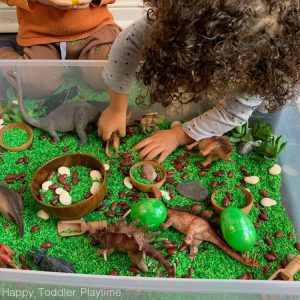
- Sensory Bin Fun 🌈
Bring a little bit of nature inside with a rainy-day sensory bin. Fill a plastic container with items like water beads, rice, or kinetic sand and add toy animals, measuring cups, and scoops for hands-on exploration. Sensory play helps with fine motor skills and cognitive development, while also providing a calming experience.
- DIY Rain Art 🎨
Take advantage of the rain by creating a fun science-meets-art activity! Let your child color on coffee filters with washable markers, then place them outside in the rain for a few moments to watch the colors blend and swirl. Once dry, you’ll have a beautiful, one-of-a-kind piece of art to display.

- Storytime Fort 📚
Build a cozy reading nook using blankets and pillows, then snuggle up for a storytelling session. Choose books with a rainy-day theme, such as The Rainy Day by Anna Milbourne or Raindrop, Plop! by Wendy Cheyette Lewison. Storytime helps build language skills, comprehension, and imagination.
- Bake Together 🍪
Turn your kitchen into a mini baking studio! Simple recipes like banana muffins or homemade granola bars offer a fun and tasty way to teach early math and science skills through measuring, mixing, and pouring. Plus, baking together encourages patience and following instructions.

- Puddle Play (With Proper Gear!) ☔
If the rain isn’t too heavy and it’s safe to go outside, embrace the weather! Dress your little one in rain boots and a waterproof jacket, then go outside for some good old-fashioned puddle jumping. This activity strengthens motor skills and allows for a fun sensory experience while enjoying nature’s wonders.
- Indoor Picnic 🧺
Bring the fun of an outdoor picnic inside! Lay out a blanket in your living room and enjoy lunch in a new setting. Pretend play like this fosters creativity and imagination while making mealtime more exciting.

- Water Play in the Sink 💦
If your child loves playing with water, set up a “kitchen sink ocean.” Fill the sink with warm water, add some floating toys, cups, or a small colander, and let them explore pouring and splashing. Water play is a great way to encourage problem-solving and sensory exploration.
Final Thoughts 🌟
Rainy days don’t have to be dreary! With a little creativity, they can become magical opportunities for exploration, discovery, and connection. Whether you’re jumping in puddles, baking together, or enjoying a cozy book nook, these activities will keep your toddler engaged, learning, and having fun—rain or shine!
Follow Susie Beghin on Instagram or visit her website for more activity Ideas.
About the Author
Susie Beghin – Early Childhood Education Expert & Creator of the Raising Bright Early Learners System
Susie Beghin is a Registered Early Childhood Educator (RECE), author, and early childhood education thought leader dedicated to helping parents and educators give young children the best start in life. As the founder of the Raising Bright Early Learners System, Susie has developed a comprehensive program designed to empower stay-at-home moms and caregivers with the tools and confidence to provide high-quality early learning experiences at home.
With 20+ years of experience as a daycare owner and Founder of Alpha’s Discovery Kids Preschool and Daycare, and mom of a child with ADHD/autism, Susie understands the challenges parents face when it comes to early childhood education. Her expertise in STEAM-based learning, play-based education, and child development has allowed her to create a system that is both accessible and impactful for parents looking to nurture their child’s curiosity and cognitive growth.
Through her book, Parents Learn to Play Too, her popular ECE Classroom podcast, and hands-on training programs, Susie bridges the gap between professional early childhood education and practical, everyday parenting. The Raising Bright Early Learners System is built on the principles of inquiry, discovery, and exploration, helping parents create engaging learning environments that spark a lifelong love of learning in their children.
Whether through social media content, workshops, or personalized coaching, Susie is committed to making early learning simple, fun, and effective for families everywhere. Join her mission to raise bright early learners and feel confident in your child’s learning journey from the very start!
4 Easy Spring Sensory Play Ideas for Toddlers and Preschoolers
4 Easy Spring Sensory Play Ideas for Toddlers and Preschoolers
by Susie Beghin
Spring is a magical time for young children. The world is waking up, flowers are blooming, and new life is sprouting everywhere. It’s the perfect season to engage kids in sensory play — helping them explore the world through touch, smell, sight, sound, and even taste! Sensory play encourages discovery and inquiry, building essential skills like fine motor development, problem-solving, and language growth.
In this blog, I’ll share some fun and easy spring sensory play ideas, including creative gardening activities to get your little ones excited about the season.

🌱 1. Planting and Gardening Sensory Bins
Gardening is one of the best hands-on sensory experiences for kids. The feel of soil between their fingers, the smell of fresh herbs, and the sight of tiny green shoots create a rich sensory experience.
What You’ll Need:
- A shallow bin or tray (or sensory bin)
- Potting soil
- Small plastic pots
- Small gardening tools (like a spade or trowel)
- Seeds (like beans, sunflowers, or herbs)
- Small flowers
- Watering Can
How to Do It:
- Fill the bin with soil and let your child dig and explore.
- Encourage them to plant seeds and cover them with soil.
- Let them use a spray bottle to water the seeds.
- Observe how the seeds begin to sprout over the next few days.
Learning Boost: Talk about what plants need to grow (sunlight, water, soil) and introduce simple science terms like “germination.”

🌸 2. Flower Petal Sensory Soup
This colorful activity combines touch, sight, and smell for a multi-sensory experience.
What You’ll Need:
- A shallow bin, bowl or tray (or sensory bin)
- Water
- Flower petals (real or fake)
- Spoons, ladles, and small cups
How to Do It:
- Fill the bowl with water and add the flower petals.
- Let your child stir, scoop, and pour the “soup.”
- Encourage them to describe how the petals feel and smell.
Learning Boost: Introduce color names and texture words like “soft,” “smooth,” and “fragrant.”
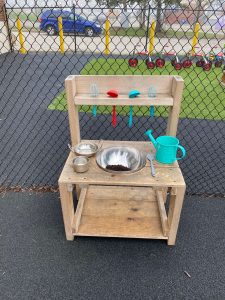
🌼 3. Mud Kitchen
Let your child engage in messy play by creating a “mud kitchen” outdoors.
What You’ll Need:
- Dirt
- Water
- Old pots, pans, and kitchen utensils
- Leaves, grass, and flowers
How to Do It:
- Set up an outdoor play area with mud and kitchen tools.
- Encourage your child to mix mud “recipes” using leaves and flowers.
- Let them squish, mold, and pour the mud to create different textures.
Learning Boost: Discuss the difference between wet and dry mud and how adding water changes the texture.

🦋 4. Birds Exploration
Spring is a busy time for birds as they make their nests! Encourage kids to observe and explore these creatures and then create a bird sensory exploration indoors.
What You’ll Need:
- Shredded paper (green and brown)
- Bird’s nest and or bird house (you can make the nest or house as a craft activity with pieces of twigs or buy it from the dollar store)
- Toy birds
- Small toy eggs (plastic)
- Feathers
- Wood pieces (twigs and small wood cutouts)
- Brown yarn cut in small pieces (worms)
- Tweezers
How to Do It:
- Arrange a combination of green and brown paper on the bottom of the bin. Place the house and nest in the bin.
- Scatter the yarn worms around the paper and hide some underneath the “grass”.
- Place the eggs in the nest as well as the birds.
- Encourage your child “feed” the birds by using the tweezers to pickup the worms and feed them to the birds.
- Encourage open-ended play with your bird habitat.
Learning Boost: Discuss how birds make nests and take care of their young.
🌷 Why Sensory Play Matters
Spring sensory play helps children develop:
✅ Fine motor skills (through digging, pouring, and stirring)
✅ Language skills (by describing textures and smells)
✅ Cognitive growth (by observing plant growth and understanding natural cycles)
✅ Emotional regulation (sensory play is calming and helps reduce stress)
Spring is the perfect time to encourage discovery and exploration through sensory play. These simple but meaningful activities will spark your child’s natural curiosity and help them connect with the world around them.
For more ideas like this, visit YouTube !
Parenting Tips: The Power of Play
Unlocking Potential: The Power of Play in Parenting
by Susie Beghin, RECE, Founder of Alpha’s Discovery Kids
With so much on their plates these days, parents often find themselves juggling multiple responsibilities, leaving little time for meaningful interactions with their children. However, research shows that parental involvement is crucial for a child’s emotional and cognitive development. In this blog, we will explore how simple strategies can transform playtime into a powerful learning experience, even amidst the hustle and bustle of daily life. We’ll also address the growing concern of screen time and offer engaging alternatives that foster creativity and connection. Plus, don’t forget to check out my book, Parents Learn to Play Too, available on Amazon, for more insights and strategies!
Parent Involvement = Happy, Smart, Confident Kids; Simple Strategies for Impactful Playtime
When parents actively participate in their children’s play, it creates a nurturing environment where kids can thrive. Studies indicate that children with involved parents are happier, more intelligent, and more confident. Here are some simple strategies to maximize your playtime:
1. Be Present
Being physically present is essential, but emotional presence is equally important. Put away distractions like your phone or laptop. Engage in the activity at hand—whether it’s building blocks, playing dress-up, or drawing. Your undivided attention sends a powerful message: “You matter.”
2. Ask Open-Ended Questions
Encourage critical thinking and creativity by asking open-ended questions during play. Instead of simply asking, “How many cars do you have?” try asking, “What do you want to do with the cars?” This not only stimulates their imagination but also fosters problem-solving skills.
3. Incorporate Learning into Play
Transform everyday activities into learning opportunities. Cooking together? Talk about measurements and ingredients. Playing outside? Discuss the weather or observe nature. These subtle integrations of learning will enhance your child’s knowledge while making playtime fun.
4. Create Routines Around Play
Establishing a routine can make playtime a cherished part of your day. Whether it’s a dedicated hour after school or a weekend family game night, consistency helps children look forward to these moments and reinforces the importance of family bonding.
By implementing these strategies, you can create an enriching environment that promotes happiness, intelligence, and confidence in your children.
 No Extra Time to Play? No Problem; Make Every Moment a Learning Moment
No Extra Time to Play? No Problem; Make Every Moment a Learning Moment
Many parents feel overwhelmed by their busy schedules and believe they don’t have time for engaging activities with their kids. However, every moment presents an opportunity for learning! Here are some ways to incorporate educational experiences into your daily routine:
1. Utilize Commute Time
Whether you’re driving or taking public transport, turn your commute into an educational experience. Sing songs together in the car to encourage language development or count the number of white trucks you see. You can turn an ordinary drive into a fun math game.
2. Household Chores as Learning Opportunities
Involve your children in household chores while teaching them valuable life skills. Sorting laundry can become a lesson in colors and patterns; cooking can introduce math through measuring ingredients; cleaning can teach responsibility and teamwork.
3. Use Waiting Time Wisely
Whether you’re waiting at the doctor’s office or in line at the grocery store, use this time to engage with your child. Play simple games like “I Spy” or read books together to pass the time.
4. Bedtime Stories with a Twist
Instead of traditional bedtime stories, encourage your child to create their own tales using prompts or pictures from books you read together earlier in the day. This stimulates creativity while reinforcing literacy skills.
Remember, every moment spent together is an opportunity for growth and connection!
Too Much Screen Time? Let’s Fix That—with Engaging, Screen-Free Activities!
In an age dominated by screens, many children are spending excessive amounts of time on devices—often at the expense of physical activity and imaginative play. Here are some engaging, screen-free activities that will captivate your child’s attention:
1. Nature Scavenger Hunts
Go on a walk in nature and talk about what you see. Print out a list of nature items and try to find them.
2. Arts and Crafts
Set up a creative corner in your home with various supplies like paper, markers, glue, and recycled materials. Encourage your child to express themselves through art projects that can be displayed around the house.
3. DIY Science Experiments
Turn your kitchen into a science lab! Simple experiments like making play dough or baking soda volcanoes not only provide hands-on learning but also spark curiosity about how things work.
4. Building Forts
Utilize pillows, blankets, and furniture to create forts together! This activity promotes teamwork and imaginative play while providing a cozy space for reading or storytelling afterward.
By incorporating these screen-free activities into your routine, you can foster creativity and strengthen family bonds without relying on screens.
Parental involvement is key to raising happy, smart, and confident children. By embracing simple strategies during playtime and making every moment count—even amidst busy schedules—you can create lasting memories that enrich your child’s development.
For more insights and activity ideas on how to engage with your child through play effectively, be sure to check out my book Parents Learn to Play Too, available on Amazon! Together we can unlock the incredible potential within our children through the power of play!
Parents are The First Educators
Parents are The First Educators
by Susie Beghin, RECE, Founder of Alpha’s Discovery Kids
In the latest episode of my podcast, The ECE Classroom, I had the pleasure of interviewing Amanda DaCosta, a supervisor at Alpha’s Discovery Kids Preschool and Daycare. Our conversation was all about the importance of play in early childhood education and how parents can get involved to support their children’s learning and development. The insights Amanda shared are valuable for both educators and parents.
The Importance of Play
Play is not just a fun activity for children; it is a fundamental aspect of their learning and development. Research consistently shows that children learn best through play and in our discussion, Amanda emphasized that play is the best way to engage children in academics and other developmental milestones. It allows children to explore, create, and learn at their own pace. By understanding the significance of play, parents can better support their children’s growth and learning experiences.

Parents as the First Educators
One of the key themes of our conversation was the recognition of parents as the first and best educators for their children. Amanda passionately stated, “Parents are the first, I think the best educator because they know the child best.” This perspective highlights the critical role parents play in shaping their child’s educational journey.
Parents often underestimate their influence on their child’s education. By being actively involved in their child’s play, parents can help reinforce concepts learned in preschool or daycare. For example, if a child is learning about colors, parents can incorporate color games during playtime at home. This not only solidifies the child’s learning but also strengthens the bond between parent and child.
Utilizing Everyday Household Items
Amanda shared practical tips on how parents can use everyday household items for play and learning. She encouraged parents to look around their homes for resources that can stimulate creativity and exploration. Simple items like cardboard boxes, kitchen utensils, and art supplies can become powerful tools for imaginative play. This approach not only makes learning accessible but also reinforces the idea that education can happen anywhere, not just in a classroom setting.
The Four Pillars of Learning
We also discussed the “four pillars of learning” that we believe are essential for child development:
- Language and Literacy: Encouraging reading and storytelling to enhance language skills. This can include reading aloud, discussing stories, and even creating their own stories together.
- STEAM: Integrating science, technology, engineering, arts, and mathematics into play to foster critical thinking. Simple experiments, building projects, and artistic activities can spark a child’s interest in these areas.
- Physical Activity and Nutrition: Promoting healthy habits through active play and nutritious meals. Physical activity is crucial for developing motor skills and overall health, while nutrition plays a key role in cognitive development.
- Mindful Awareness: Teaching children to be present and aware of their feelings and surroundings. Mindfulness activities can help children manage their emotions and develop a sense of empathy towards others.
These pillars serve as a framework for parents and educators to create enriching experiences that support holistic development. By focusing on these areas, parents can ensure that they are nurturing well-rounded individuals who are prepared for future challenges.
The Importance of Communication
Another vital aspect we explored was the importance of communication between educators and parents. Amanda stressed that effective communication is crucial in demonstrating the value of play-based learning. By sharing insights, resources, and strategies, educators can empower parents to engage in their children’s learning journeys. Regular updates and workshops can help parents understand the significance of play in their child’s development, fostering a collaborative approach to education.
“Parents Learn to Play Too” Book
We also spoke about my book being released on Sept 15th, Parents Learn to Play Too, which serves as a guide for parents looking to incorporate play into their daily routines. This resource offers a variety of activities and tips that can easily be integrated into family life, making it an invaluable tool for fostering learning through play.
Favorite Activities for Parents and Children
As we wrapped up the episode, I reflected on just how much play impacts early childhood education. Amanda and I agreed that empathy, communication, and creativity are key to fostering a love of learning. Our conversation left me feeling inspired and excited to share these insights with listeners. It’s a powerful reminder of the critical role parents play in their child’s education, and how play is the foundation for learning.
Stay tuned for more insightful discussions on early childhood education, parenting, and educator empowerment. Let’s continue to learn, grow, and make a difference in the lives of our students every day.
You can listen to the podcast on your favorite podcast platform, or by clicking here: https://open.spotify.com/show/7Hg7rTtRQggsVSCbbOdvP2?si=paCEPiCRRGK7yOfrTTsh8Q
Playdates: The Secret Weapon for Raising Well-Rounded, Socially Adept Kids
Playdates: The Secret Weapon for Raising Well-Rounded, Socially Adept Kids
by Susie Beghin, RECE, Founder of Alpha’s Discovery Kids
In today’s fast-paced, technology-driven world, it’s easy for children to become disconnected from their peers. As a mother and an Early Childhood Education (ECE) professional, I know firsthand how critical social interaction is for a child’s development. Learning through play is one of the most effective ways to foster this interaction. Enter the humble playdate – a powerful tool that can unlock a world of social, emotional, and cognitive benefits for your little one.
Playdates are more than just a chance for kids to have fun; they are essential building blocks for developing crucial social skills. Through these structured interactions, children learn to navigate the complexities of communication, cooperation, and conflict resolution. They practice sharing, compromising, and considering the perspectives of others – all of which contribute to the development of empathy and emotional intelligence.
As children engage in playdates, they learn to express their feelings, needs, and boundaries in a healthy way. This helps them build resilience and the ability to handle social challenges that may arise in the future. Playdates also provide a safe environment for children to experiment with different social roles and behaviors, allowing them to find what works best for them.
Playdates also allow children the opportunity to explore their interests, showcase their talents, and try new activities. This can lead to a significant boost in confidence and self-esteem, which can have a lasting impact on their overall well-being and future success.

When children feel accepted and valued by their peers, they are more likely to develop a positive self-image. Playdates allow children to experience the joy of being accepted for who they are, which can be a powerful antidote to the insecurities that often arise during childhood.
The friendships that blossom during childhood playdates can often last a lifetime. These connections provide a sense of belonging, support, and shared experiences that can enrich a child’s life in countless ways. By fostering these relationships early on, you are setting your child up for a lifetime of meaningful social connections.
Playdates also provide a safe and nurturing environment for children to learn about the complexities of relationships. As they navigate the ups and downs of friendship, they develop the skills necessary to maintain healthy, fulfilling relationships throughout their lives. And they don’t just benefit a child’s social skills – they can also have a positive impact on their cognitive and physical development. Through imaginative play, children can hone their problem-solving abilities, enhance their creativity, and even improve their motor skills.
When children engage in pretend play during playdates, they are exercising their imagination and creativity. This type of play has been shown to boost cognitive flexibility, which is the ability to think outside the box and adapt to new situations. Additionally, physical games and activities during playdates can help children develop their gross and fine motor skills, laying the foundation for future physical development and athletic abilities.
Now that we’ve explored the many benefits of playdates, let’s dive into some practical tips for hosting successful ones:
- Set clear expectations and boundaries: Before the playdate begins, discuss with your child what is expected of them in terms of behavior, sharing, and respecting others.
- Provide a variety of engaging activities: Have a mix of toys, games, and activities available to cater to different interests and age groups.
- Supervise, but don’t hover: Be present to ensure everyone is having fun and staying safe, but allow the children to navigate their interactions independently.
- Encourage communication and problem-solving: If conflicts arise, help the children express their feelings and work together to find a solution.
- Keep it short and sweet: For younger children, aim for playdates that last 1-2 hours, as they may have shorter attention spans and need breaks.
In a world that can sometimes feel increasingly isolated, the power of playdates to nurture social development cannot be overstated. By making them a regular part of your child’s routine, you are investing in their future, helping them to become confident, empathetic, and well-rounded individuals. So, embrace the playdate and watch your child’s social skills soar to new heights.
Follow Susie Beghin on Instagram or YouTube for more early childhood tips and advice.
The ECE Classroom – Recap of Episode 3 – Play-based Learning: Fostering Autonomy and Belonging in the Classroom
The ECE Classroom – Recap of Episode 3 – Play-based Learning: Fostering Autonomy and Belonging in the Classroom
by Susie Beghin, RECE, Founder of Alpha’s Discovery Kids
“Play-based learning is more than just unstructured free play” – Susie Beghin
In the latest episode of my podcast, The ECE Classroom, I had the pleasure of discussing play-based learning with Erica Saccoccio, owner of A Family Tree Child Care. Erica’s passion for early childhood education shone through as she shared valuable insights on making play-based learning both fun and educational.
Play-Based Learning: Fun with a Purpose
Erica emphasized that play-based learning should be engaging and enjoyable for children while also having a clear learning objective. This approach ensures that children are not only having fun but are also developing crucial skills. She highlighted the importance of using intentional materials and providing guidance to children during their play. By carefully selecting materials and activities, educators can create rich learning experiences that foster development across various domains.
Observation-Based Learning
One of the key points Erica discussed was the concept of observation-based learning. She stressed how important it is for educators to observe how children interact with materials and each other. These observations can provide deep insights into each child’s learning style, interests, and developmental needs, allowing educators to tailor their teaching strategies accordingly.
The Role of Teacher Engagement
Our conversation also highlighted the crucial role of teacher engagement and enjoyment in the learning process. When teachers are genuinely involved and enthusiastic about the activities, it creates a positive and dynamic learning environment. This not only enhances the effectiveness of the learning experiences but also makes the process more enjoyable for both teachers and children.
Key Topics Discussed
- The Role of Routines: Erica explained how incorporating play into daily routines can be a great way to engage children and promote their social and emotional development. Routine activities, when infused with playful elements, become more enjoyable and meaningful for children.
- Children’s Autonomy: Allowing children to have a say in their activities fosters independence and confidence. Erica highlighted the importance of giving children choices and respecting their preferences, which helps them feel valued and understood.
- Communicating with Parents: It’s essential to help parents understand the significant benefits of play-based learning. Erica and I discussed strategies for communicating with parents and involving them in their child’s learning journey, ensuring they appreciate the value of play in early childhood education.
My Five Key Principles of Play
During the episode, I also shared my five key principles of play, which are designed to create a safe and nurturing environment for children to learn, explore, and express themselves:
- Follow the Child’s Lead: Allow children to guide their play and explore their interests.
- Engage in Meaningful Conversation: Use play to have meaningful interactions and discussions with children.
- Ask Open-Ended Questions: Encourage children to think creatively and critically by asking questions that don’t have a single correct answer.
- Play at the Child’s Physical Level: Join children in their play environment, whether it’s on the floor, outside, or at a table.
- Combine Free Play and Intentional Play: Balance unstructured play with activities that have specific learning goals.
Takeaways from the Episode
- Play-based learning should be enjoyable and goal-oriented.
- Intentional materials and teacher guidance are crucial.
- Observation-based learning helps in understanding and guiding children.
- Routines can be playful and involve children in decision-making.
- Educating parents about the benefits of play-based learning is vital.
Stay tuned for more insightful discussions on early childhood education, parenting, and educator empowerment. Let’s continue to create engaging, purposeful, and joyful learning experiences for our children.
You can listen to the podcast on your favorite podcast platform, or by clicking here: https://spotifyanchor-web.app.link/e/OPl10EGzNIb


